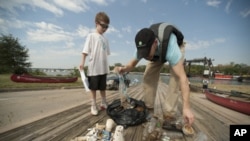Last September, more than 600,000 volunteers from all over the world participated in International Coastal Cleanup Day. According to a report released recently, they removed more than 3.5 million kilos of trash from ocean beaches, rivers and other waterways worldwide, enough to cover 170 football fields. They collected enough tires to outfit almost 6,000 cars, and enough cigarette butts to fill nearly 95,000 packs.
Talking trash
The report is called "Tracking Trash: 25 Years of Action for the Ocean." It contains data and stories about the trash that volunteers collected during last year's International Coastal Cleanup Day.
The annual event is organized by the advocacy group, Ocean Conservancy. Plastic bottles, bags, cigarette butts and other trash are clogging the oceans and killing marine mammals and sea turtles every year, according to Vikki Spruill, the group's president.
"Earth, as we know it, is a water planet," says Spruill. "If you look from outer space, you see blue before you see the land. It’s all connected. The ocean is the system that actually provides the rain water that we all depend on in our life. Half of the oxygen in the next breath you’re going to take comes from the oceans."
Watch silent video of clean up:
Luckily, she says, thousands of people from more than 120 countries and all 50 U.S. states care enough to volunteer every year for clean ups of the planet's waterways, beaches and ocean fronts.
"We have students, school kids, scout troops, stay-at-home mothers. We have military leaders, every imaginable walk of life, participating in these cleanups."
International effort
One of those volunteers is Oscar Oviedo, a banker from the Dominican Republic. "A couple of friends and myself, we practice scuba diving and we began to see the situation of the ocean from underneath and said we had to do something," he says. "So we established our own foundation, Vida Azul, which means Blue Life, four years ago. We gathered about 1,800 volunteers."
They've been cleaning waterways in the Santo Domingo area.
"What we’re doing is we organize speeches and reunions where we talk about the importance of water and try to get people involved, mostly children under 12," Oviedo says. "I think we’re pretty effective. A lot of people know about our efforts and they know the importance of not throwing trash in rivers and lakes and the ocean as well."
When Blue Life volunteers reach out to school children, he says, they raise other issues as well.
"For example, we ask them if they’ve seen their fathers while they shave. We say if you close the water every time you shave, then you open the tap again to wash the razor, you’re saving so much amount of water."
Spreading the word
Judy Bolin, an American from the east coast state of North Carolina is also concerned about the oceans. She runs NC Big Sweep, a group which conducts year-round education to cut down on littering.
"The great thing about people participating in the clean ups is that after they’re finished with their cleanup, we’ll hear them say, ‘I didn’t know there was so much litter out there. I’m never going to litter again,'" says Bolin. "It’s an eye-opening experience for everyone as it was for me. I remember one time we released a green heron from a fishing line out there in the river, and it was just wonderful to see it fly away and recover from what someone had done, [leaving] a fishing line in the river, which is not a good thing to do."
Now, Bolin says, volunteers from all over the world can communicate and exchange experiences.
"We’ve got social media. We’ve just started getting into Facebook and Twitter last year and a couple of our counties were successful recruiting volunteers this way. So we’ve got connections all over the world."
Judy Bolin and Oscar Oviedo say they hope more volunteers will join their effort to clean up the oceans. To those who cannot join, they say, please stop littering our waterways.





